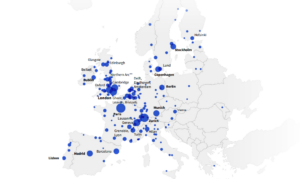Novel genetic engineering: NGOs fear free pass for GMO food in EU

The impact of climate change is already evident for all of us. Frequent extreme weather phenomena pose a particular problem for local agriculture. Amid all this, some see novel genetic engineering as a solution to the challenges we are faced with. Still, experts remain divided on the topic of genetically modified foods (GMO).
The European Commission is expected to release a new study on the regulation of new genetic engineering on April 30th. Depending on the outcome, environmental organizations fear process technologies may be deregulated. German Environment Minister Svenja Schulze already published his position against loosening the regulations. Austria too has seen resistance from organizations such as Global 2000, IG Saatgut, and Greenpeace.
Turn off, remove, or add genes
Discussions on gene modifications have been around for a while and will probably continue in the future. The focus of the debate now is on novel gene editing technologies, such as the so-called Crispr gene scissors. Crispr stands for “clustered regularly interspaced short palindromic repeats”. The method allows inserting, removing or deactivating genes and has attracted the interest of the food and medical industries alike. Its discoverers, French biologist Emmanuelle Charpentier and US biochemist Jennifer Doudna, won the 2020 Nobel Prize in Chemistry.
The use of this method in the food industry, however, remains controversial. In July 2018, the European Court of Justice ruled that the Crispr gene scissors should be classified as genetic engineering and should therefore be strictly regulated by legislation in force for modified foods, involving risk assessment, traceability, and labeling in stores.
Accusation: “Lifestyle products” in the focus of research
Environmental protection organizations now fear that this decision may be reversed by the forthcoming EC research paper. In a joint study, Global 2000 and IG Saatgut examined the current state of Crispr gene scissors use in the food sector. They found the existence of two plants developed through genetic modification currently grown on a commercial scale. The plants are a herbicide-resistant rapeseed from US-based Cibus and a soy variety by US-based Calyxt, whose oil is said to contain fewer trans fatty acids. According to the study, in early-2021 Japan approved the use of a tomato created using the Crispr gene scissors which has antihypertensive and relaxation-promoting properties.
Lack of research on climate-resistant properties
According to Global 2000, however, the majority of climate-resistant foods are yet to hit the market or are still in their planning stage of development. In some cases, they are still missing the scientific basis for their properties, such as drought tolerance, for example. Global 2000 and IG Saatgut believe that, in the face of climate change, the focus so far has been on the so-called “lifestyle products” and herbicide-resistant foods instead of finding solutions.




























